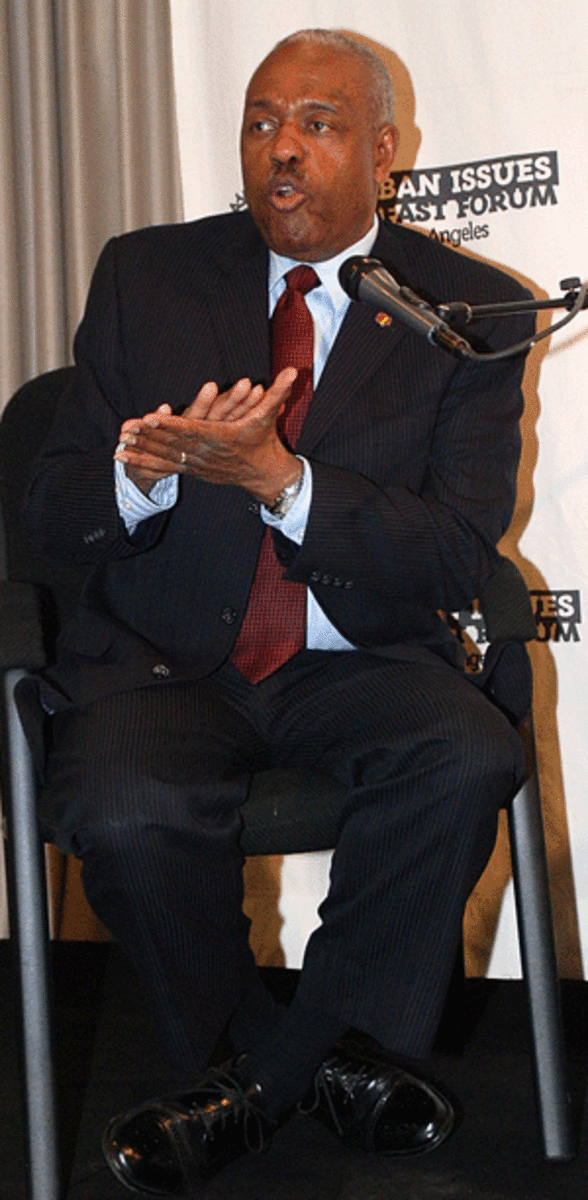by Dick Price & Sharon Kyle – LA Progessive e-newsletter & blog
December 28, 2008 -- In his first public appearance since his contract was bought out by the Los Angeles Board of Education, Superintendent David Brewer said his ouster will only make a bad situation worse. “This district has eaten up five superintendents in 14 years,” he said in speaking to the Urban Issues Forum a week ago last Friday. “You’re not going to make progress with that kind of instability.”
Hosted by Anthony Asadullah Samad at the California African-American Museum, the monthly breakfast event attracts a mostly African-American audience although the doors are open to all. Samad brings speakers who address social and political issues relevant to urban Los Angeles and its surrounding communities. Past speakers have included Barack Obama, Cornel West, Tavis Smiley, and Antonio Villaraigosa.
This particular forum was scheduled months before Brewer was ousted, according to Samad, who intended to bring Superintendent Brewer to the community to discuss the progress he has made after just two years on the job. News of his buyout came just weeks before the event.
“In districts where superintendents have turned situations around, in Chicago and New York City, for example, they’ve had time and space to make progress—six to 10 years,” Brewer said, comparing the challenges in Los Angeles with other cities. “In two years? You can’t get anything done that fast, especially when you’re where Los Angeles is. LA is behind; it will take time to catch up.”
In recent reports, LAUSD School Board president Monica Garcia made it clear that she was seeking to replace Brewer. All but two school board members approved a buyout of Brewer’s contract of $517,500. Mayor Villaraigosa reportedly said he favored a change in leadership.
Replacing Brewer, at least in the interim, will be Ramon Cortines, a retired superintendent who was brought in by Brewer to serve as senior deputy superintendent. Cortines has been running day-to-day operations since he came onboard eight months ago.
Data Will Set You Free
Citing his philosophy that “data will set you free,” the retired Navy vice admiral pointed to the progress LA’s schools have made in the short time he’s been at the helm as nothing short of phenomenal. “We’ve had a 21-point growth in API scores this year, to 683,” he said in his upbeat presentation to the forum. “That’s better than the state as a whole and the highest gain of any major school district in California.”
“Our 12th grade enrollment is also up, to 34,763—the highest it’s been since 1997,” he continued.
Brewer has attempted to run the district according to, what he calls, five “guiding principles:”
- We will be a data-driven organization; we will use research and analysis to make decisions.
- All of our employees will be lifelong learners.
- We will actively encourage change and innovation within the District
- We will empower and engage parents and partner with the community.
- We will ensure the physical and emotional safety of our students.
As part of his efforts to take LA’s schools to the next level, Brewer was planning to unveil the “school report card” this January, a system that grades schools much like students are graded. He intended to use this tool to promote school visibility with parents, teachers, and the general public. He also planned to implement a Web-based application that allows teachers to look at each student’s education background, modeled on the SchoolNet program developed in the Inglewood School District.
Brewer was also developing plans for more boarding schools, modeled on successful pilots undertaken in Washington D.C. and Atlanta as well as single-gender academies in New York City.
“The Seed boarding school in Washington serves grades 6 to 12. It’s a good example for us,” Brewer said. “Los Angeles needs 10 similar boarding schools, especially for our foster kids. We have 14,000 foster children in this district and another 10,000 who are homeless.” He also wanted to implement a teacher-mentoring program, based on the “sailor-to-admiral” program from his Navy days, designed to improve development of new teachers.
While praising him for working with the Legislature on the education budget—Los Angeles school’s budget will need to cut another $200 million, according to Brewer—his critics claim that the gains in scores and enrollment aren’t really the result of Brewer’s action and also slight his lack of educational background and the slow pace of accomplishment, according to the Los Angeles Daily News.
Where From Here
Brewer, who is a black man, did not think his ouster was race-based. However, he does see a racial and gender connection to the problems with LA’s schools.
“Middle class blacks and Latinos score below poor whites and poor Asians,” he said in returning to his beloved statistics. “So LA’s low scores aren’t just an economic problem.” He also emphasized the performance gap when gender was considered. The bottom line is that black and brown boys are not being educated in Los Angeles schools.
He attributed this education gap partly to what he called an “expectation bias,” both for Latino students and especially for black students, who fulfill a prophesy by performing poorly on tests and in school generally, in part because they’re not expected to perform as well as white and Asian students.
“But that expectation bias goes throughout our schools, through the community, and into our black homes,” he said. “We’ve got a generational issue coming out of slavery. Blacks don’t read the way whites do.”
“Whenever I take a flight, I walk down the aisle and see who’s reading,” he said in speaking to a nearly all-black audience. “It’s not us.”
“What I wanted to do, when I came here, was to change the culture in the schools,” Brewer said. “But we also have to change the culture in the community. We’ve got to get to parents, get them educated, get them stabilized. If you want your child to love reading, you’ve got to read yourself.”
What He Might Have Done
“Well, politics is a contact sport. The only thing I could have done was to delay the inevitable,” Brewer said when asked what he might have done differently. “I could have spent more time working politically—former Superintendent Ray Romer was a master politician. But I thought that if I spent that much time in politics, what would give? Working with the kids—that would have had to give.”
After seeing the strong evidence suggesting Brewer was making significant progress with the LAUSD, we asked why he thought he was asked to leave.
In a way that seemed to skirt the question, Brewer talked about politics. He said he believed the elective nature of the LAUSD board might be part of the problem, for him and for other superintendents past and future. “What you have in the country, you have political boards whose members have their own agendas,” Brewer said. “It doesn’t matter what progress you’re making.”
“Philly and Chicago have gone to appointed boards—three appointed by the governor, three by the mayor, I believe,” he continued. “Somehow you’ve got to give superintendents time and space to make changes.”
< Dr. Anthony Asadullah Samad
After Brewer spent a couple of minutes giving his answer, Moderator Samad jumped in and put the issue in balder terms:
“Sharon, the deal is about the money,” Samad said. “The budget for LAUSD is four times the LA City budget. Most of that budget goes toward building projects. Every board member has a favorite contractor to build buildings. Antonio has some guys who want to get at that pot of money.”
Samad speculated that Brewer’s removal may have a lot to do with a potential Villaraigosa run for the governorship, in this case aided by the school board members he helped to get elected.
Conclusion
The forum concluded with Brewer being surrounded by a supportive audience looking for ways to continue to support his agenda after he is gone and Cortines takes the helm. With the passage of Measure Q—the $7 billion school bond—there will be resources to achieve some, if not all, of Brewers initiatives. Let’s hope the kid’s needs don’t get lost in all of the politics.




No comments:
Post a Comment